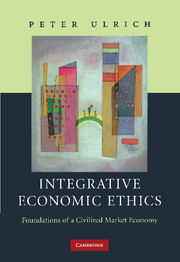Book contents
- Frontmatter
- Contents
- List of figures
- Preface
- Translator's note
- Introduction: orientation in economic-ethical thinking
- Part I Fundamental concepts of modern ethics and the approach of integrative economic ethics
- Part II Reflections on the foundations of economic ethics I: a critique of economism
- Part III Reflections on the foundations of economic ethics II: rational economic activity and the lifeworld
- Part IV A topology of economic ethics: the ‘sites’ of morality in economic life
- 8 Economic citizen's ethics
- 9 Regulatory ethics
- 10 Corporate ethics
- Bibliography
- Index of subjects
- Index of names
8 - Economic citizen's ethics
Published online by Cambridge University Press: 22 September 2009
- Frontmatter
- Contents
- List of figures
- Preface
- Translator's note
- Introduction: orientation in economic-ethical thinking
- Part I Fundamental concepts of modern ethics and the approach of integrative economic ethics
- Part II Reflections on the foundations of economic ethics I: a critique of economism
- Part III Reflections on the foundations of economic ethics II: rational economic activity and the lifeworld
- Part IV A topology of economic ethics: the ‘sites’ of morality in economic life
- 8 Economic citizen's ethics
- 9 Regulatory ethics
- 10 Corporate ethics
- Bibliography
- Index of subjects
- Index of names
Summary
The old Hobbesian dream of conceiving and founding a free society entirely on a ‘system of ordered egoism’, without requiring any moral virtues of citizens, is still haunting us today in certain ideologies which call themselves liberal. As we have shown in Chapter 5, and particularly in Section 5.3, these ideologies amount to pure economic liberalism and political economism, as they understand politics merely as the continuation of business with other means. Behind this view lies a conception of citizens who are defined purely by their private legal claims and interests and are mutually indifferent to one another; they enter into social interaction only when it seems individually useful to them. John Rawls also believed at first that he could approve of this mutual indifference for the persons in his imaginary ‘original position’ behind the ‘veil of ignorance’ and that they need not be expected to follow any rationality other than pure economic rationality, i.e. the ability to pursue their own interests intelligently.
As we have seen in Section 7.2, however, the later Rawls, in his revised perspective on political liberalism as a condition for a well-ordered society, expressly assumed the existence of moral persons who have a sense of justice and are capable of conducting their lives in accordance with a conception of the good.
- Type
- Chapter
- Information
- Integrative Economic EthicsFoundations of a Civilized Market Economy, pp. 273 - 314Publisher: Cambridge University PressPrint publication year: 2008
- 1
- Cited by

